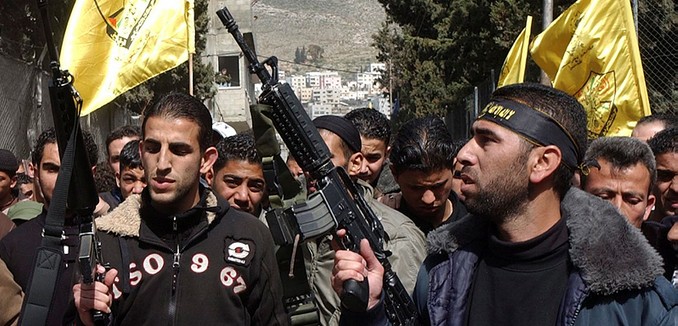Clashes between gunmen and Palestinian Authority police in the West Bank have intensified in the run-up to the leadership meeting of the long-ruling Fatah party later this month, the Associated Press reported Monday.
One of the Fatah-aligned gunmen, Hatem Abu Riziq, spoke to the AP about his decision to participate in fierce shootouts against the Palestinian Authority, which is led by President Mahmoud Abbas. “I no longer want to fight Israel,” said Abu Riziq, who was imprisoned by Israel for seven years for aiding a suicide bombing. “I’m not willing to die for these officials who are only taking care of their families and letting us suffer.”
Abu Riziq’s stance on Abbas reflects popular Palestinian dissatisfaction with Fatah and the Palestine Liberation Organization, described by the AP as “organizations seen as stale and ossified.” The upcoming convention, which is set to include elections for new political leadership, “is whipping up the tensions that have sparked waves of internecine violence around the West Bank,” the AP reported.
About a dozen people have already been killed in the internecine violence this year.
At the heart of the conflict is the rivalry between Abbas and Mohammad Dahlan, a former top Fatah official in the Gaza Strip who is currently in exile in the United Arab Emirates. A Palestinian court convicted Dahlan in absentia on corruption charges in 2011 (a case that was later dismissed), but he retains influence and a following in the West Bank.
The last Fatah convention was held in 2009 and a subsequent one was supposed to take place in 2014. “Abbas repeatedly delayed it, both because Dahlan still enjoyed strong support and because the Palestinian leader had no great interest in making changes,” the AP noted. “Each side is [now] believed to be pumping funds to supporters, among them armed men, in a bid to buy loyalty.”
Jihad Harb, a Palestinian analyst, told the AP that “the fighting in the streets is a sign of the fighting within the movement, and it’s a small scenario of what will happen if the succession battle takes place.”
Sixty-five percent of Palestinians in the West Bank and Gaza want Abbas to resign, according to a June poll by the Ramallah-based Palestinian Center for Policy and Survey Research.
The Palestinian president, who is now in the 11th year of a four-year term, has been working to increase his power and stave off challengers. In April, Abbas established a new court system packed with loyalists to further consolidate his power. The PA also viewed the now-cancelled municipal elections as a first step toward holding new presidential and national elections, which would legitimize the rule of Abbas or his successor.
Numerous analysts have associated Abbas’s growing authoritarianism with the PA’s failure to develop the institutions necessary for statehood. Former Israeli Defense Minister Moshe Ya’alon told an audience at the Washington Institute for Near East Policy in September, “I’m not talking about infrastructure, water, electricity – security. [Abbas] can’t survive a day without our security activities. Yes we have to say they do part of the job, we do most of the job in fighting Hamas, Palestinians Islamic Jihad, [ISIS] in Judea and Samaria.”
Grant Rumley, a research fellow at the Foundation for Defense of Democracies (FDD), also warned in May that the West’s refusal to challenge the growing corruption and autocratic rule under Abbas “could have a devastating effect on the long- prospects for a viable Palestinian state.”
In a similar vein, Jonathan Schanzer, president for research at FDD, asserted in September that Abbas’ refusal to step down from power or prepare for succession was damaging the Palestinians’ chances for statehood:
Political challengers are put down with brutality, press freedom has shriveled, and allegations of corruption swirl. The result is a brittle, autocratic government increasingly viewed as a tool for Abbas to wield power, rather than a state in the making.
[Photo: Wagdi Ashtiyeh /Flash90 ]




